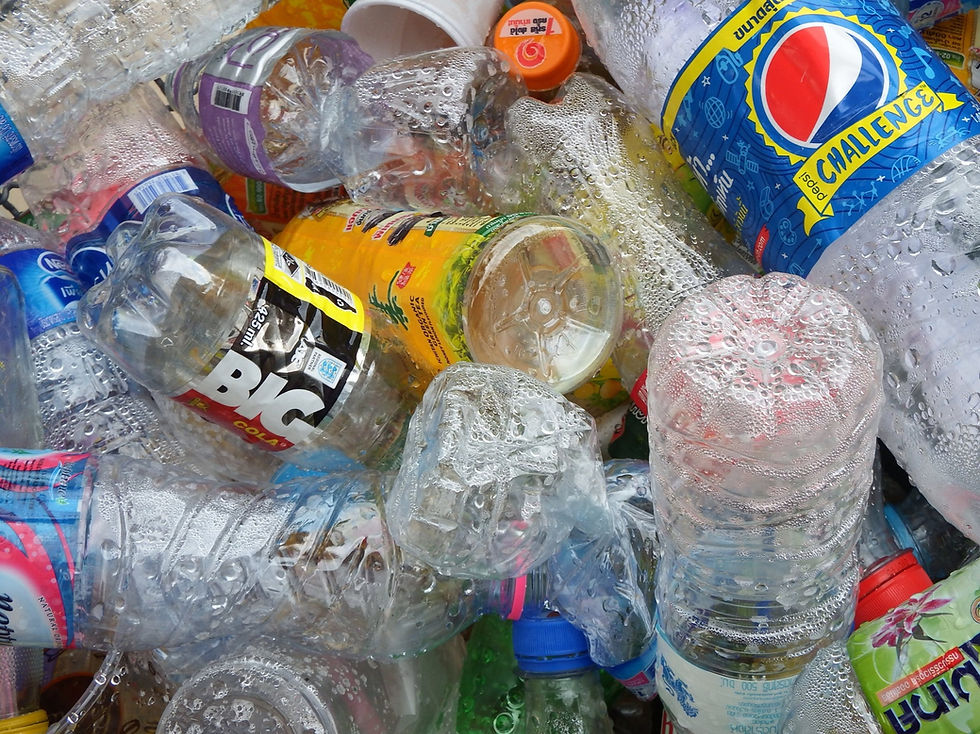Informed Choices: BPA
- Jamie Langes
- May 3, 2021
- 3 min read
This blog post is the second (the first being PFAS) in a series to help you to understand what certain chemicals are, what they are used for (and in), and how they are impacting the sustainability of this planet. It's all about making those personal choices for sustainability, but I feel many of us are ill-informed and the more we understand, the better we can combat or change our negative directions.
Overall, I want to convey what BPA is, and how the chemical (and it's alternatives) might be negatively affecting you and the planet. Ultimately, I want to help enable you as a consumer to make more informed choices about what you purchase or the companies you choose to support to increase sustainability. I'm featuring BPA because plastics are everywhere and BPA "lives" in plastics; many of which are circulating the globe containing products and produce that we consume.

What is BPA?
Bisphenol A (BPA) is a chemical created originally in the 1960s and is used (largely) to manufacture polycarbonate (poly meaning "many" and carbonate meaning a carbon compound) plastics. Those plastics include final use as beverage containers (the most well-known application), but also compact discs (CDs), plastic dinnerware, impact-resistant safety equipment (i.e. - glasses or goggles), automobile parts, and toys. BPA is also used in epoxy resins such as bottle tops, food can liners, and water supply pipes.
Exposure to humans is largely secondary sources (i.e. - primary would be directly ingesting or putting on your skin through dermal exposure); those sources are from eating or drinking from plastics containing BPA. This includes the water supply pipes that are lined with BPA-containing epoxy resins.
What's the problem?
In 2003-2004, CDC scientists measured BPA in the urine of over 2,500 participants aged 6 years and older who took part of the National Health and Nutrition Examination Survey (NHANES). From this data, scientists can extrapolate (or estimate) the amount of BPA in humans for a larger population. The results of this test showed that 93% of those tested had BPA in their bodies, and extrapolation study from those metrics has indicated that BPA is widespread in the U.S. population (www.cdc.gov/biomonitoring/BisphenolA_FactSheet.html).
Although human health effects from exposure to BPA through secondary sources is not yet known, there are studies that have shown a correlation (a connection) between BPA levels and developmental effects in fetuses and newborns. Due to growing concern, additional studies were undertaken by the National Institute of Environmental Health Sciences (NIH-HHS) via the NTP Center for the Evaluation of Risks to Human Reproduction (CERHR). The evaluation concluded that there is "some concern" over BPA's effects on brain, behavior, and prostate gland in fetuses, infants and children at current exposure levels (niehs.nih.gov/health/materials/bisphenol_a_bpa_508.pdf). This conclusion is also supported by the FDA (www.fda.gov/newevents/publichhealthfocus/ucm064437.htm).

What have we done to "help?"
Due to the possible health effects of BPA on humans, many manufacturers have started to replace BPA with other substitute chemicals. Often, these products are labeled BPA-free. These alternatives were studied in 2017 by EPA scientists (www.epa.gov/sciencematters/are-bpa-substitutes-any-safer-bpa) The researchers specifically tested the impact of the alternative BPA chemicals on the endocrine system (which could have serious implications on fetuses, infants and young children). The results showed that in some of the alternatives used to replace BPA, the chemicals activated the estrogen receptor more than BPA itself. This suggests that the replacements for BPA might be more harmful to human health and environment than the original chemical of concern.
What can I do as an individual?
You can reduce your exposure to BPA (and its alternatives), and in turn, "demand" by your selection of products and choices that corporations evolve from use of BPA / BPA alternatives in plastics (or, avoid plastics altogether) with the following:
Avoid any plastic containers (bottles, cups, plates or bowls) with the label #7 on the bottom
Do not wash polycarbonate plastics in the dishwasher (heat & detergent make accelerate the breakdown of the plastic and release of more BPA).
Opt for unlined cans or swap altogether for frozen options (where possible)
Avoid plastic containers altogether and opt for glass, porcelain or stainless steel options.
Eat at home which will limit the use of plastics from the food industry and which will in turn limit the BPA used in such plastics.

If we all make the better choice, change WILL happen.
With love & hope for a better future for all of us - Jamie

Comments